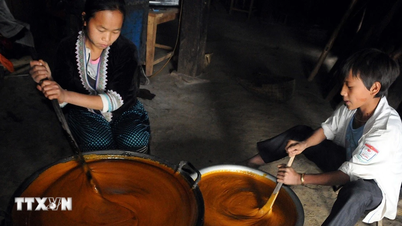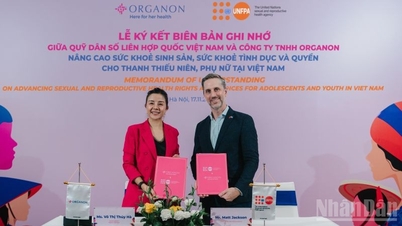The Hanoi Center for Sexual Medicine, Hanoi Andrology and Infertility Hospital, recently received a 39-year-old female patient who came for examination suffering from stress, anxiety, and prolonged insomnia.
The Hanoi Center for Sexual Medicine, Hanoi Andrology and Infertility Hospital, recently received a 39-year-old female patient who came for examination due to stress, anxiety, and prolonged insomnia affecting her married life, family, and work.
 |
| Doctors at the Hanoi Andrology and Infertility Hospital provide consultation to patients. |
According to Ms. Pham Minh Ngoc, Deputy Director of the Hanoi Center for Sexual Medicine, the 39-year-old female patient who came for examination at the center had a history of good health and no underlying medical conditions.
The patient came for examination due to marital problems despite having a stable job and no pressure regarding children. Doctors at the Hanoi Center for Sexual Medicine ordered the female patient to undergo ultrasound of the thyroid gland, breasts, abdomen, electrocardiogram, blood lipid test, assessment of liver and kidney function, and complete blood count to screen for cancer risk.
After ensuring there is no risk of cancer, the patient is advised to undergo treatment with hormone therapy, estrogen supplementation, etc.
The doctor also advised the patient to exercise at least four times a week, relieve stress, and dedicate more time to self-care, such as practicing yoga or taking walks. In addition, the patient should adjust their diet, supplementing with foods such as soybeans, grains, sunflower seeds, and bean sprouts.
After treatment, many patients showed significant improvement in hot flashes, reduced stress, depression, and anxiety, improved sexual function, smoother skin, and improved memory and concentration.
In some cases, endocrine therapy can also prevent osteoporosis, reduce cardiovascular risk, and alleviate urinary disorders and urinary tract infections.
According to Ms. Pham Minh Ngoc, Deputy Director of the Hanoi Center for Sexual Medicine, if women experience symptoms like those of the female patient above that last from 3 to 6 months and do not improve on their own, they should consult a specialist for advice and treatment.
It is known that investing in women's healthcare is a global concern, not just in Vietnam.
Between 2020 and 2022, the number of cases of malnutrition among pregnant or breastfeeding women increased by 25%, from 5.5 million to 6.9 million.
The UNICEF report is based on an analysis of data on women in most countries around the world . According to the agency, more than 1 billion women and adolescent girls globally suffer from malnutrition.
This condition will cause them to be underweight and shorter than the average for their physical development, due to a lack of essential micronutrients and anemia.
Most of these cases occur in the poorest regions of the world, with South Asia and sub-Saharan Africa where up to 68% of adolescent women and girls are underweight and 60% suffer from anemia.
UNICEF stated that these nutritional deficiencies not only affect the health of women but also their children, noting that "poor nutritional status is passed down through generations."
Malnutrition not only increases the risk of infant mortality, but can also "undermine fetal development, leaving lifelong consequences for a child's growth, learning ability, and later social status."
A UNICEF report states that globally, 51 million children under the age of two are stunted. It is estimated that approximately 50% of these children are stunted from the womb and during the first six months of life, when they are entirely dependent on their mother's nutrition.
According to experts, between 2020 and 2022, the number of cases of malnutrition among pregnant or breastfeeding women increased by 25%, from 5.5 million to 6.9 million, in 12 countries facing food crises: Afghanistan, Burkina Faso, Ethiopia, Kenya, Mali, Niger, Nigeria, Somalia, Sudan, South Sudan, Chad, and Yemen.
UNICEF emphasizes that without urgent action from the international community, the consequences could last for future generations. To prevent malnutrition in children, we must also address malnutrition in women and adolescent girls.
In addition, UNICEF calls on governments to prioritize women and girls' access to nutritious food and to implement mandatory measures to expand large-scale micronutrient fortification of everyday foods such as flour, cooking oil, and salt, to help reduce micronutrient deficiencies and anemia in girls and women.
Source: https://baodautu.vn/phu-nu-trung-nien-can-luu-y-gi-de-dam-bao-suc-khoe-d219850.html



































![[Photo] Prime Minister Pham Minh Chinh holds a phone call with the CEO of Russia's Rosatom Corporation.](/_next/image?url=https%3A%2F%2Fvphoto.vietnam.vn%2Fthumb%2F1200x675%2Fvietnam%2Fresource%2FIMAGE%2F2025%2F12%2F11%2F1765464552365_dsc-5295-jpg.webp&w=3840&q=75)











































































Comment (0)